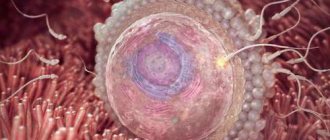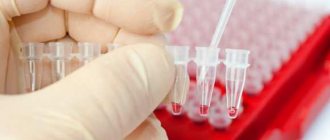Pregnancy test
A blood test for hCG (human chorionic gonadotropin) can be taken by doctor's direction or you can go to a private clinic to conduct the test yourself. However, judging by the reviews, in Russia it is not possible to get a coupon for a free test in every municipal clinic, and you have to wait 3-4 days for the result. This is too much of a test for women's nerves. Therefore, most turn to paid laboratories. The results obtained can tell a lot about a woman’s new position.
Representatives of the fairer sex have heard a lot about a blood test for pregnancy, but not everyone understands its essence. The results of the study do not simply give an answer: positive or negative, as is the case with the use of pharmaceutical strips. The results of the analysis show a quantitative value, the interpretation of which can give:
- confirmation of pregnancy or its denial;
- assessment of compliance with the deadline;
- determination of the fact of pregnancy progression;
- assessment of the risks of congenital anomalies in the fetus.
A blood test for hCG shows the amount of this hormone in a woman’s blood. To understand the essence of the study, you need to learn more about human chorionic gonadotropin.
This is a substance that is normally produced only during pregnancy. After the fusion of the egg and sperm, a trophoblast is formed - a kind of placenta rudiment. The trophoblast produces b hCG, the level of which increases every day. If in the first days after fertilization this substance can only be detected by taking a blood test, then after some time the pregnancy hormone also appears in the urine. At that moment, the woman is already experiencing a delay and can do the usual test at home.
Take a short online pregnancy test on our website in a couple of minutes and get an answer whether you are pregnant or not.
Human chorionic gonadotropin includes two subunits - alpha and beta. In the case of expectant mothers, the latter is studied. It is necessary to understand about the hCG blood test that this is a test that determines the level of the beta subunit of human chorionic gonadotropin in the blood.
Blood test for hCG: when will it show pregnancy?
When it is necessary to determine whether pregnancy has occurred or not as early as possible, even before the first delay of menstruation occurs;
In addition to a pregnancy test, which does not always give an accurate result, it is recommended to carry out an analysis for hCG. It allows you to determine conception within 10 days from its onset.
Depending on the duration of pregnancy, this indicator will change in the blood, which also helps to establish not only the fact of pregnancy, but also how long gestation lasts.
What is hCG?
Structure of human chorionic gonadotropin
HCG is a hormone that is synthesized by cells of the embryonic structure.
This process begins as soon as the egg is introduced into the endometrium of the uterus (implanted into it), and 6 to 8 days pass from the moment of fertilization.
During this period, the fertilized cell passes through the fallopian tubes into the uterine cavity. There will be no hormone production yet, and therefore in the first week after successful conception it will not yet be possible to determine pregnancy.
The substance hCG, which is fully called human chorionic gonadotropin, is required to ensure that the necessary conditions are created in the woman’s body to maintain pregnancy and the proper development of the embryo. Under the influence of the hormone, the processes responsible for the cycle and maturation of eggs are suppressed, since this is not required in the next 9 months.
Also, thanks to hCG, the corpus luteum actively produces progesterone, estrogens and androgens, without which it is impossible to maintain pregnancy.
In addition, this hormone is responsible for changes in the functioning of the adrenal cortex, which in turn leads to a physiological decrease in immunity, since otherwise the body will perceive the embryo as a foreign body that needs to be rejected, and pregnancy will be impossible.
When to get tested for hCG
The increase in hormone levels from the moment the egg is implanted into the endometrium of the uterus occurs once every two days.
Since within a week after fertilization the egg only migrates to the implantation site, it is possible to obtain analysis results that will indicate the onset of pregnancy only 10 days from the moment of fertilization.
The test can detect the condition about a week later.
The woman will receive a referral for analysis from a gynecologist, who will then guide her if pregnancy occurs. He will also decipher the analysis.
How to take it correctly
On the eve of the test - only healthy food
Since the correctness of the test result is influenced by many factors, before taking it, a woman is advised to make sure that she does not have colds or infectious diseases; and also withstand several days if there has been severe stress. An unhealthy diet can also skew the results.
To establish pregnancy even before a missed period, observations of hormone changes in dynamics are most often carried out. This means that a woman will need to donate blood several times at intervals of 2-4 days.
The day before the material is taken, you need to give up fatty foods, as well as fried foods, sweets and spicy foods, as such nutrition will affect the composition of the blood.
The fasting period before blood collection should be from 6 to 8 hours. You can drink clean, non-carbonated water at this time.
If you were treated with hormonal drugs less than 2 weeks before the test, you must inform your doctor about this.
Interpretation of analyzes
The test is deciphered by the attending doctor
The analysis is deciphered only by a doctor. Laboratory workers have no right to comment on the results obtained. It is possible to independently understand whether pregnancy is taking place.
The gynecologist will be able to accurately determine the woman’s condition after receiving the hCG results over time.
If the analysis value is from 0 to 5 mU/ml, then there is no pregnancy, or too little time has passed since conception and the egg has not implanted in the uterus.
Test error
Despite the fact that the hCG test is considered one of the most accurate ways to determine pregnancy in the early stages, it is impossible to completely guarantee that an error will not occur. Because of this, an additional blood donation may be required if the results are suspicious.
False positive result
Pathology of the thyroid gland can distort the result
A false positive test result can be observed in the following cases:
- carrying out hormone therapy shortly before submitting the material;
- tumor growths in the body, and primarily in the organs of the reproductive system;
- pathologies of the thyroid gland and other hormonal disorders in the body.
Retaking the test will determine whether there is pregnancy or whether the hCG elevations are of a different nature.
False negative result
This phenomenon can be observed during analysis in the case when too little time has passed since conception and the fertilized egg has not yet penetrated the wall of the uterus. Also, a similar effect can occur if a woman has an ectopic pregnancy. In this case, she requires urgent examination, as this condition is life-threatening.
Source: https://gidanaliz.ru/berem/bak-berem/krov-na-hgch-beremennost.html
When to do the analysis
Women planning to conceive are interested in the question of when they can donate blood for hCG after sexual intercourse. You can determine whether conception has taken place using this method within 5-7 days from the moment of ovulation. It is important not to confuse the moment of sexual intercourse with the day the egg is released, since rupture of the follicle may occur somewhat later. Conception will take place only after complete ovulation. From this moment on, the most impatient can count down the week and take a blood test for hCG.
For a more accurate result and a clear picture confirming pregnancy, doctors recommend conducting the study from the 5th day of missed menstruation. The study, which is carried out to determine the progression of pregnancy, is carried out with a break of 2-3 days.
The analysis is mandatory for women at screenings 1 and 2 (12 and 17 weeks). In addition, the indications for diagnosing human chorionic gonadotropin are as follows:
- amenorrhea (absence of menstruation for a long time);
- suspicion of incomplete miscarriage;
- suspected ectopic pregnancy;
- threat of interruption;
- the likelihood of growth of a malignant neoplasm.
Interestingly, the study can be carried out not only on women. For men, the test is recommended if testicular tumors are suspected, and it is carried out on any day convenient for the patient.
What is hCG
HCG or human chorionic gonadotropin is a hormone that is produced by the chorion due to fertilization of the egg and its attachment in the uterine cavity. Approximately seven days after the fusion of germ cells, a sharp increase in the hormone occurs. This indicator reaches a peak at the end of the third month, then slowly decreases or remains at a constant level. A blood test for hCG will show pregnancy and help track its normal course. A decrease in the indicator may indicate fetal fading or the threat of miscarriage.
Properties of human chorionic gonadotropin
During ovulation, luteinizing hormone is produced, which helps maintain the functioning of the corpus luteum, which supports the egg at the level of fertilization. If the process is successful, human chorionic gonadotropin is produced. With its help, the fertilized egg is attached to the wall of the uterus. This occurs approximately 10 days after ovulation, given that the menstrual cycle is uniform. At this point, the increased level of the hormone can already be noticed by laboratory methods.
General value
The hormone performs several functions:
- protection of the fertilized egg from immunoglobulins;
- building the circulatory system in the uterus;
- maintaining pregnancy;
- stimulation of male reproductive seeds, which contributes to the normal development of the genital organs in boys;
Interesting fact! The hormone is also produced in the male body, although its value does not exceed 5 mIU/ml. In men, this hormone ensures normal testosterone levels.
How to prepare for research
You can donate blood and determine the hCG value by referral from a doctor (free) or based on your own suspicions (paid). The average cost of diagnostics varies from 500 to 1000 rubles. The price of the analysis may vary slightly depending on the region in which the research is carried out. Also, some private clinics charge an additional fee for collecting material.
Before you donate blood, you need to prepare. The main point for expectant mothers, which plays an important role as a result of the analysis, is the day of the cycle. You should not go to the laboratory immediately after sexual intercourse; you need to be patient. The optimal time to donate blood for hCG is when pregnancy shows, that is, a maximum of 7-10 days before the expected menstruation. Having decided on the day, you should prepare for the diagnosis:
- donate blood only on an empty stomach;
- if the study falls in the afternoon, then the last meal should be taken 8-10 hours before;
- the day before the diagnosis, give up alcohol and eliminate fatty foods;
- On the day of sampling, you are allowed to drink clean still water.
If a woman is taking any medications, which is not uncommon when planning a pregnancy, then she must inform the laboratory assistant about this. Gynecological practice shows that only medications containing human chorionic gonadotropin (for example, an injection of hCG) can distort the norms. They are prescribed to stimulate ovulation. Any other medications, including hormonal ones, are not able to increase or decrease the level of this hormone in a woman’s blood.
Benefits of Blood Test
Thanks to pharmacy tests, you can easily determine pregnancy if you choose a product with high sensitivity. But it happens that pregnancy has already occurred, and the test shows one line. The delay continues, but the woman is in thought, because the result is negative. An hCG test will help dispel doubts and show a more accurate result about pregnancy. You need to take a pregnancy test in the first days of your delay. In another way, this is a urine test for hCG, which shows a weaker concentration of the hormone. This testing option is significantly inferior to the laboratory method.
The advantage of the laboratory method is that it shows the threat of miscarriage, fetal death and genetic abnormalities already in the early stages, which is beyond the power of pharmacy pregnancy tests. You can donate blood for hCG when the test shows pregnancy for an accurate result.
HCG norm after ovulation and conception
The interpretation of the results obtained should be carried out by a doctor. However, each laboratory has its own norms and units of measurement of hCG by day from conception, so the form must indicate the acceptable range. Thanks to established standards, a woman can independently interpret the results. A table indicating the range of corresponding values for each week from conception will be an assistant in this.
In the first weeks after fertilization, the hCG level increases day by day. Every 1-1.5 days the value doubles. Therefore, a low result on the 8th day after fertilization can already become impressive on the 10th day. The hCG value normally reaches its maximum result by 8-10 weeks. After this it gradually decreases. The level of hCG in the urine “lags” behind the level of the hormone in the blood by 2-3 days. It is important to know what deviations from generally accepted ranges can reveal.
If the hCG decoding shows that the values are too high, then this may be a cause for concern. This happens with cancer of the intestines, genitals, mammary glands, and other organs in women and men. Indicators may be higher than normal during a hydatidiform mole or after a poorly performed abortion. All these conditions require mandatory medical care. For beta hCG analysis, norms may be higher under the following circumstances:
- taking drugs based on human chorionic gonadotropin or synthetic gestagens;
- multiple pregnancy;
- chromosomal abnormalities in fetal development;
- toxicosis of the first third of pregnancy;
- diabetes.
The hCG level by days from conception may not coincide with generally accepted standards and deviate downward. When the values decrease, we can talk about:
- ectopic pregnancy;
- incorrect deadline;
- undeveloped pregnancy;
- threat of interruption;
- placental insufficiency;
If the levels of human chorionic gonadotropin do not correspond to the deadline, then the woman is recommended to retake the test in a few days. It is impossible to make any diagnoses based on one study. It is necessary to talk about the problem after a detailed diagnosis, which will include not only a blood test, but also instrumental studies, for example, ultrasound.
Why do a test during pregnancy?
Some women are advised to monitor human chorionic gonadotropin levels after a confirmed pregnancy. Periodic hCG tests with a break of several days are prescribed for:
- threat of miscarriage, when there is bleeding and there is a serious threat to the life of the fetus;
- suspected ectopic pregnancy, when a fertilized egg is not detected in the uterus for a reasonable period of time;
- suspected miscarriage;
The level of hCG during pregnancy, the norm of which is given above, is not an independent diagnosis. If there is a deviation from the standard ranges, it is necessary to look for the cause of the violations. It is possible to interpret the results and talk about deviations only after several studies.
It also happens that the pregnancy date is set incorrectly. In this regard, the level of human chorionic gonadotropin does not correspond to the standard, but at the same time, pregnancy continues to develop. In this case, an ultrasound examination will help dispel doubts, which, during the first screening, allows you to determine the age of the fetus with maximum accuracy.











